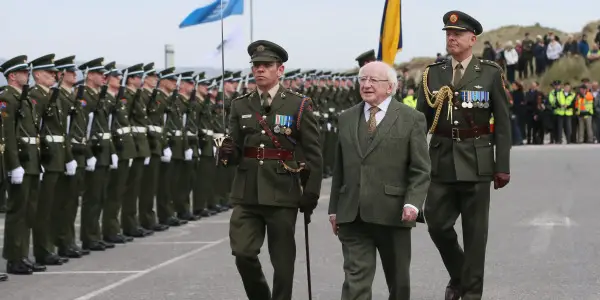President Michael D Higgins has led a day of commemorations for Sir Roger Casement by describing him as a great Irish patriot and one of the 20th century’s great humanitarians.
Wreaths were laid at the monument dedicated to his role in the 1916 Rising beside Banna Strand and also at a State ceremony overlooking the sea where the rebel arrived in a German U-boat.
Thousands of people attended the event with every vantage point taken on the dunes above the beach.
The President said the commemoration was about taking pride in Casement’s idealism, his exposure of exploitation by empires and his commitment to the cause of freedom in Ireland and abroad.
Mr Higgins said the centenary is a chance to engage with the fundamental questions he raised about power and human rights, the rights of communities and indigenous peoples and foreign policy and international trade rules.
“It is only now, despite the pioneering humanitarianism of such as Casement, that the degradation of indigenous peoples has grew into a central issue in human rights discourse,” he said.
“At the same time, it is in those very regions visited by Casement that we continue to see today the greatest damage to ecosystems and communities – and where, outrageously, once again immunity is being sought by irresponsible but powerful commercial interests in sectors such as logging and mining.”
Casement was hanged in Pentonville Prison, London, on August 3 1916 after being found guilty of treason. His remains were returned to Ireland in 1965.
After years working for Britain’s foreign service, and exposing abuses in rubber plantations run by Belgium’s King Leopold II in Congo, he was knighted.
In 1914 he exposed similar human rights issues in Brazil. At the same time was a member of the Irish Volunteers and helped in the Howth gun running of that year.
After spending 18 months in Germany while the First World War raged he travelled on U19 under Captain Raimund Weissbach to rendezvous with The Aud, a ship carrying 20,000 guns to Kerry for the Rising.
The link-up did not go as planned and Casement came ashore at Banna with Captain Robert Monteith and Daniel Bailey on Good Friday, April 21.
The Aud was intercepted by the British Navy and was scuttled by its captain, Karl Spindler, off Cork.
Casement was arrested while holed up in McKenna’s Fort near Banna suffering from the affects of malaria.
His grandniece Lesley McNaughton laid a wreath in his honour at the monument near Banna before the State ceremony took place.
A descendant of Captain Weissbach, Christian Weissbach, accepted an invite to the commemoration.
The German and British ambassadors to Ireland, Matthias Hopfner and Dominick Chilcott, also attended.
The deaths of Con Keating from Caherciveen, Donal Sheehan from Newcastle West and Charlie Monahan from Belfast on Good Friday 1916 were also remembered at Ballykissane Pier, Killorglin.
They drowned in an aborted Irish Republican Brotherhood mission to to seize wireless radio equipment from the Atlantic College in Caherciveen.
President Higgins, who laid a wreath at the anchor from the Aud in front of Banna Strand, also opened the country’s first major exhibition on Casement at the Kerry County Museum.
He described him as a full-blown Irish revolutionary.
“Today we must also recall how, in a true Republican spirit, Roger Casement’s generous vision for the Ireland of the future was one that included all of the people of Northern Ireland, in the diversity of their beliefs, origins and history,” the President said.
“This was a vision which Casement recalled in that same speech from the dock, when he said: ‘We aimed at uniting the Ulster Volunteers to the cause of United Ireland. We aimed at uniting all Irishmen in a natural and national bond of cohesion based on mutual self-respect’.”
